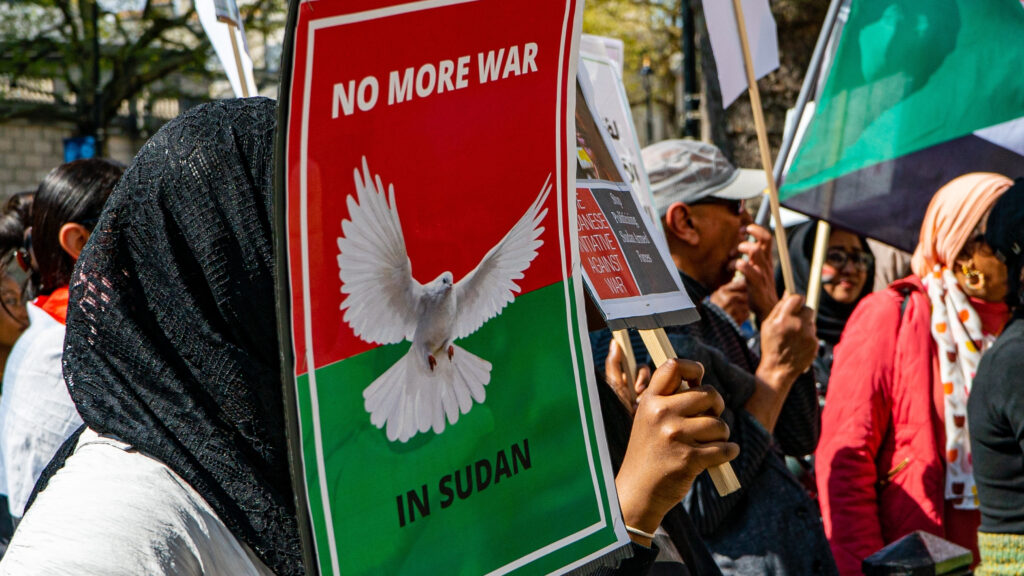IIE Scholar Rescue Fund Supports Academics Threatened by Humanitarian Crisis in Sudan
“April 14, 2023, is a date I will never forget. My family and I embarked on what we believed would be an ordinary day in Khartoum, my beloved city. It was a hot midday, and we were in the midst of shopping for my young daughter to buy her a new outfit for Eid al-Fitr, the Islamic celebration that follows a month of fasting. After a tiresome search, we managed to find a lovely pair of trousers and a blouse that she adored. However, the perfect pair of shoes remained elusive. Our fasting and fatigue led us to promise that we would buy the shoes tomorrow, and we returned home.”
Dr. Rasha Siddig Azrag, a medical entomologist and IIE Scholar Rescue Fund (IIE-SRF) fellow from Sudan, never had the opportunity to buy her daughter those shoes. The day after her shopping trip, fighting erupted between the Sudanese Armed Forces (SAF) and the paramilitary Rapid Support Forces (RSF). The humanitarian crisis and higher education emergency that was created fueled IIE-SRF’s largest surge in fellowship applications in its more than 20-year history. The next day, when Azrag’s young daughter reminded her mother of their plan to look for the shoes, she had to tell her that it was too dangerous to go outside.
“Days turned into weeks, and we came to accept the grim reality that we were in the midst of a real war. The sounds of bombs, gunfire, and warplanes reverberated through our city, an incessant reminder of imminent danger. It was a constant fear that at any moment, one of those deadly bombs could strike us or our children.”
As the world grapples with multiple conflicts and crises, many of which have dominated media headlines, Sudan’s civil war has received less attention, despite the dire circumstances in the country. According to the UNHCR, more than 10.2 million people have been displaced since the start of the conflict, and an estimated 25 million people –more than half of Sudan’s population – are in need of humanitarian assistance. It is currently the largest internal displacement crisis in the world. The International Rescue Committee named Sudan as the top country at greatest risk of experiencing new humanitarian crises in its 2024 Emergency Watchlist. The list of threats facing the country includes the threat of mass killings and forced displacement along ethnic lines, increased poverty and food insecurity, difficulties with distributing humanitarian aid, and the potential collapse of the healthcare system.
Sudan’s academics, students, and higher education institutions are also impacted. More than 100 universities have been damaged, looted, or completely destroyed. In an interview with University World News, Professor Mohamed Hassan, the president of the Sudanese National Academy of Sciences and the World Academy of Sciences in Italy, said that “this destruction has led to a complete standstill in teaching and research activities in many universities and higher education institutions, significantly disrupting the country’s educational progress.” In addition to these disruptions to higher education, the UNHCR estimates that nearly 19 million Sudanese children are currently unable to attend school, threatening the educations of an entire generation of learners.
Azrag worried about the impact this war could have on her and her children, saying that, “I am aware that the upheaval my family and I are going through is bound to have a significant psychological impact. I am very concerned about this, and I believe time is of the essence if we are to avoid lasting negative impact. I consider myself lucky to be alive and in a safe place with my kids. But I need to work – not only to provide for my family but also to contribute to the advancement of science and the education of Sudan’s youth. An opportunity to get back to pursuing my scientific career will go a long way to alleviate this.”
Azrag, who was able to reach safety in Egypt with her family, was selected for the IIE-SRF fellowship in March 2024. She is one of 23 Sudanese scholars awarded an IIE-SRF fellowship since the crisis began in April 2023. Several of these scholars are now continuing their work in safety at host institutions in Egypt, Germany, Iraqi Kurdistan, Jordan, Malaysia, Oman, and the U.S. IIE-SRF is finalizing host placements for the other fellows. Azrag recently began her fellowship at the University at Buffalo, where she will continue her research on mosquitos found in Khartoum State and her work on a surveillance system for disease vectors. More Sudanese scholars will be considered for fellowships in the coming months.
IIE-SRF is committed to supporting Sudanese scholars whose lives and careers have been upended by this brutal war. This effort, along with the work of other IIE initiatives supporting students and artists – including the IIE Artist Protection Fund and the IIE Odyssey Scholarship – will help to ensure that Sudan’s crucial knowledge is preserved and that, when the situation improves, scholars can contribute to the rebuilding of the Sudanese academy.
IIE’s Scholar Rescue Fund (IIE-SRF) is the only global program that arranges, funds, and supports fellowships for threatened and displaced scholars at partnering higher education institutions worldwide, including inside their home regions. At the heart of IIE-SRF is the idea that each scholar we support is a beacon of hope in our world. Since 2002, IIE-SRF has supported more than 1,100 scholars from 62 countries in partnership with more than 500 host institutions in 59 countries.
